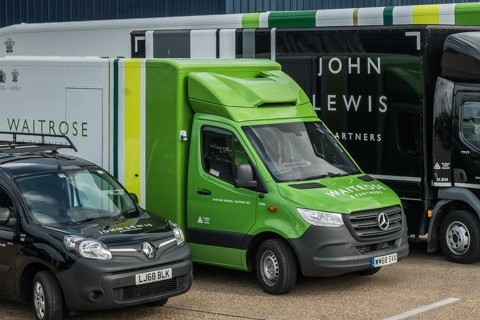// John Lewis Partnership promises to reduce carbon emissions to net zero by 2050
// Affects all John Lewis and Waitrose stores, offices, warehouses and other sites
// Partnership’s entire transport fleet will be zero carbon by 2045
The John Lewis Partnership has pledged to reduce its operational greenhouse gas emissions to net zero by 2050 at the latest.
The parent company of Waitrose and John Lewis said it would initially focus on making significant reductions within the next 10 years to decarbonise its operations as much as possible as quickly as possible.
By 2028, it hopes to have removed a third of carbon from its operations through investment in new refrigeration technology, biomethane-powered trucks, electric vans and renewable electricity.
The partnership expected this to result in carbon dioxide savings equivalent to removing 16,000 petrol cars off the road every year.
READ MORE:
John Lewis Partnership said the new targets build on significant emissions reductions already achieved, including a 70 per cent reduction in emissions achieved last year against a 2010 baseline – two years before the 2020 deadline the company had set itself.
To help reduce transport emissions, which contribute over 40 per cent of the its overall carbon footprint, the partnership has set a target of zero carbon fleet by 2045.
The company said it has already started rolling out new biomethane-powered heavy trucks, which emit over 80 per cent less carbon dioxide than standard diesel alternatives, and aims to switch its entire fleet of over 3200 vehicles to zero-emission vehicles.
The heavy trucks will be switched to biomethane by 2028 while the electrification of vans used for home deliveries is starting to be rolled out.
The John Lewis Partnership said it was also working on encouraging sustainable travel across the business and to its locations, and has already installed 75 electric vehicle charging points across its estate.
To reduce emissions from its physical estate, the partnership pledged to reduce its energy use by a quarter.
It also said it would strive make sure electricity across all its sites was 100 per cent renewable and British-sourced by 2028.
In addition, the company will phase out cooling systems that emit hydrofluorocarbons greenhouse gases and replace them with environmentally-free refrigerators in the next 10 years.
Waitrose has already started rolling out a new design of shelf-edge strips which uses racing car technology to make its shop refrigerators more energy efficient.
To date, over 110 Waitrose and John Lewis stores have been certified under the BREEAM process – which benchmarks the environmental performance of buildings – and the partnership said it intends to continue strengthening the responsible development standards it applies to every construction project.
The partnership will also be assessing emissions impact outside its operations, with the aim of setting further targets for emissions reduction in its supply chain, aligned with the goals of the Paris Accord.
It already carries out assessments of its Waitrose fresh produce, livestock and farmed fish supply chains, looking at a range of aspects including water use, biodiversity and waste and energy.
The company also has commitments to source sustainable raw materials as well as targets to reduce plastic waste.
“We recognise that urgent action is needed to keep global warming below 1.5C to avoid the most dangerous impacts of climate breakdown, and we are responding with our most ambitious set of targets yet, aiming to decarbonise as much as we can in the next 10 years and setting out a clear path to becoming a net zero operation,” John Lewis Partnership corporate responsibility director Benet Northcote said.
“It’s of paramount importance to us as a co-owned business to ensure the partnership is prepared for the future.
“We are now only one generation away from 2050 and we are committed to playing our part in transitioning to a zero carbon future.”
Click here to sign up to Retail Gazette‘s free daily email newsletter


















